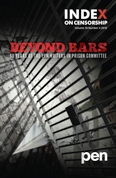 It’s vital for democracies that we allow the free flow of information and ideas. On the Day of the Imprisoned Writer, Index on Censorship calls for a renewed campaign to support writers under threat
It’s vital for democracies that we allow the free flow of information and ideas. On the Day of the Imprisoned Writer, Index on Censorship calls for a renewed campaign to support writers under threat
“It helps to remember that we are not alone, nor forgotten, as our captors would like us to think‚” wrote Léster Luis González Pentón, one of the Black Spring writers released from a Cuban jail last July. He is one of many writers featured in the next issue of Index on Censorship’s special issue on writers in prison, produced in collaboration with English PEN and its Writers in Prison Committee (WiPC).
Faraj Sarkoohi, imprisoned in Iran in the 1990s, told novelist and PEN campaigner Moris Farhi: “Though I was held incommunicado in prison, news of your activities somehow reached me. That gave me the strength to keep going.”
Even though the world has changed dramatically since WiPC was founded, writers remain as vulnerable to dictators and bullies as ever. As Ron Deibert points out, the freedom so happily anticipated online has not quite come to fruition. Bloggers are the most recent to join the frontline, exposed to the surveillance and intimidation of regimes wanting to control information. Suwicha Thakor from Thailand, Tunisia’s Zauhaier Maklouf and Nobel Prize winner Liu Xiaobo are among the online journalists Deibert highlights. And of course, Egyptian blogger Karem Amer, who was due for release on 10 November, is on the minds of all free expression advocates. He remains in jail and there are reports that he is being persistently harassed in detention.
“It’s debatable”, Tom Stoppard writes, “whether writing exerts any leverage on the fate of nations, but when it comes to the fate of individuals no one, not even a writer, needs to be useless. Political prisoners are less vulnerable when they are kept in our view and known to be so.
We’re still living in a world where writing can be a dangerous business. Writers are locked up for exercising their right to free speech; torture, intimidation and legal recourse are still among the tactics used to silence them. It is essential that writers are cherished and valued; as documenters and yarn-spinners; they also need to be challenged, engaged with and invited into debate.
As English PEN president Lisa Appignanesi writes in the issue, “keeping the terrain of expression free is a continual challenge”. ‘We all need fresh ideas, open exchange and imagination to keep our plural democracies robust.’ This is vital to protecting our own democracies, and to fostering democracies elsewhere. Defending our writers is as important now as it has ever been.
Beyond Bars: 50 Years of the PEN Writers in Prison Committee is out on 16 December




